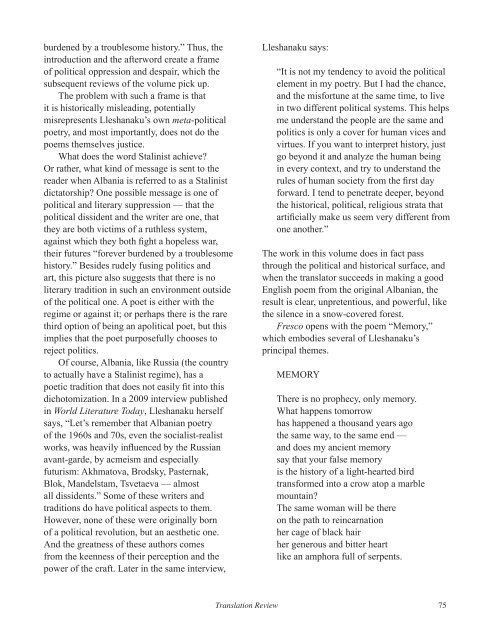Table of contents - The University of Texas at Dallas
Table of contents - The University of Texas at Dallas
Table of contents - The University of Texas at Dallas
You also want an ePaper? Increase the reach of your titles
YUMPU automatically turns print PDFs into web optimized ePapers that Google loves.
urdened by a troublesome history.” Thus, the<br />
introduction and the afterword cre<strong>at</strong>e a frame<br />
<strong>of</strong> political oppression and despair, which the<br />
subsequent reviews <strong>of</strong> the volume pick up.<br />
<strong>The</strong> problem with such a frame is th<strong>at</strong><br />
it is historically misleading, potentially<br />
misrepresents Lleshanaku’s own meta-political<br />
poetry, and most importantly, does not do the<br />
poems themselves justice.<br />
Wh<strong>at</strong> does the word Stalinist achieve<br />
Or r<strong>at</strong>her, wh<strong>at</strong> kind <strong>of</strong> message is sent to the<br />
reader when Albania is referred to as a Stalinist<br />
dict<strong>at</strong>orship One possible message is one <strong>of</strong><br />
political and literary suppression — th<strong>at</strong> the<br />
political dissident and the writer are one, th<strong>at</strong><br />
they are both victims <strong>of</strong> a ruthless system,<br />
against which they both fight a hopeless war,<br />
their futures “forever burdened by a troublesome<br />
history.” Besides rudely fusing politics and<br />
art, this picture also suggests th<strong>at</strong> there is no<br />
literary tradition in such an environment outside<br />
<strong>of</strong> the political one. A poet is either with the<br />
regime or against it; or perhaps there is the rare<br />
third option <strong>of</strong> being an apolitical poet, but this<br />
implies th<strong>at</strong> the poet purposefully chooses to<br />
reject politics.<br />
Of course, Albania, like Russia (the country<br />
to actually have a Stalinist regime), has a<br />
poetic tradition th<strong>at</strong> does not easily fit into this<br />
dichotomiz<strong>at</strong>ion. In a 2009 interview published<br />
in World Liter<strong>at</strong>ure Today, Lleshanaku herself<br />
says, “Let’s remember th<strong>at</strong> Albanian poetry<br />
<strong>of</strong> the 1960s and 70s, even the socialist-realist<br />
works, was heavily influenced by the Russian<br />
avant-garde, by acmeism and especially<br />
futurism: Akhm<strong>at</strong>ova, Brodsky, Pasternak,<br />
Blok, Mandelstam, Tsvetaeva — almost<br />
all dissidents.” Some <strong>of</strong> these writers and<br />
traditions do have political aspects to them.<br />
However, none <strong>of</strong> these were originally born<br />
<strong>of</strong> a political revolution, but an aesthetic one.<br />
And the gre<strong>at</strong>ness <strong>of</strong> these authors comes<br />
from the keenness <strong>of</strong> their perception and the<br />
power <strong>of</strong> the craft. L<strong>at</strong>er in the same interview,<br />
Lleshanaku says:<br />
“It is not my tendency to avoid the political<br />
element in my poetry. But I had the chance,<br />
and the misfortune <strong>at</strong> the same time, to live<br />
in two different political systems. This helps<br />
me understand the people are the same and<br />
politics is only a cover for human vices and<br />
virtues. If you want to interpret history, just<br />
go beyond it and analyze the human being<br />
in every context, and try to understand the<br />
rules <strong>of</strong> human society from the first day<br />
forward. I tend to penetr<strong>at</strong>e deeper, beyond<br />
the historical, political, religious str<strong>at</strong>a th<strong>at</strong><br />
artificially make us seem very different from<br />
one another.”<br />
<strong>The</strong> work in this volume does in fact pass<br />
through the political and historical surface, and<br />
when the transl<strong>at</strong>or succeeds in making a good<br />
English poem from the original Albanian, the<br />
result is clear, unpretentious, and powerful, like<br />
the silence in a snow-covered forest.<br />
Fresco opens with the poem “Memory,”<br />
which embodies several <strong>of</strong> Lleshanaku’s<br />
principal themes.<br />
MEMORY<br />
<strong>The</strong>re is no prophecy, only memory.<br />
Wh<strong>at</strong> happens tomorrow<br />
has happened a thousand years ago<br />
the same way, to the same end —<br />
and does my ancient memory<br />
say th<strong>at</strong> your false memory<br />
is the history <strong>of</strong> a light-hearted bird<br />
transformed into a crow <strong>at</strong>op a marble<br />
mountain<br />
<strong>The</strong> same woman will be there<br />
on the p<strong>at</strong>h to reincarn<strong>at</strong>ion<br />
her cage <strong>of</strong> black hair<br />
her generous and bitter heart<br />
like an amphora full <strong>of</strong> serpents.<br />
Transl<strong>at</strong>ion Review 75

















